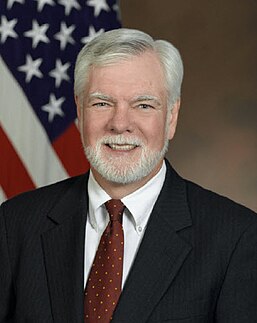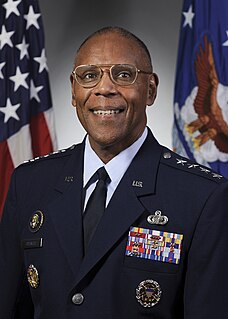
The Department of the Treasury (USDT) is an executive department and the treasury of the United States federal government. Established by an Act of Congress in 1789 to manage government revenue, the Treasury prints all paper currency and mints all coins in circulation through the Bureau of Engraving and Printing and the United States Mint, respectively; collects all federal taxes through the Internal Revenue Service; manages U.S. government debt instruments; licenses and supervises banks and thrift institutions; and advises the legislative and executive branches on matters of fiscal policy.

The Secretary of the Army is a senior civilian official within the Department of Defense of the United States with statutory responsibility for all matters relating to the United States Army: manpower, personnel, reserve affairs, installations, environmental issues, weapons systems and equipment acquisition, communications, and financial management.

William Birrell Franke was an American businessman and government official. He was best known for his service as United States Secretary of the Navy from 1959 to 1961 under Dwight D. Eisenhower.

John D. Hawke Jr. served as the United States Under Secretary of the Treasury for Domestic Finance from 1995 to 1998, and was United States Comptroller of the Currency from 1998 to 2004.

The Under Secretary of State for Management is a position within the United States Department of State that serves as principal adviser to the Secretary of State and Deputy Secretary of State on matters relating to the allocation and use of Department of State budget, physical property, and personnel, including planning, the day-to-day administration of the Department, and proposals for institutional reform and modernization.

The Under Secretary of Defense (Comptroller)/Chief Financial Officer, abbreviated USD(C)/CFO, is a high level civilian official in the United States Department of Defense. The Under Secretary of Defense (Comptroller) is the principal staff assistant and adviser to both the Secretary of Defense and the Deputy Secretary of Defense for all budgetary and fiscal matters, including the development and execution of the Defense Department's annual $500 billion budget.

Charles Arthur Bowsher is an American businessman and politician. He served as the 6th Comptroller General of the United States from 1981 to 1996. During that period, he led the Government Accountability Office in addressing the savings and loan crisis and other major issues. He also served as the 5th Assistant Secretary of the Navy during the Lyndon B. Johnson administration from 1967 to 1971.

Robert F. Hale was the United States Under Secretary of Defense (Comptroller) from 2009 until 2014 and before that the Assistant Secretary of the Air Force. Hale has over thirty years of experience as a professional financial manager serving in a wide range of national defense related roles. In addition to his most recent position as Under Secretary of Defense and his previous appointment as Assistant Secretary of the Air Force, Hale has also served in the National Security Division of the Congressional Budget Office and as Executive Director of the American Society of Military Comptrollers. Hale is a fellow of the National Academy of Public Administration and a former member of the Defense Business Board. He was appointed to the National Commission on the Future of the Army by Representative Adam Smith (D-WA).

Jamie Michael Morin is a former senior official in the United States Department of Defense. He was a private sector economist and research consultant before earning a Doctorate degree in political science from Yale University. He then served as a professional staff member on the United States Senate Committee on the Budget. Morin was Director of Cost Assessment and Program Evaluation at the Department of Defense. Previously, he was Assistant Secretary of the Air Force, and served concurrently as Acting Under Secretary of the Air Force from 3 July 2012 to 28 April 2013. He joined The Aerospace Corporation in 2017 as executive director of the Center for Space Policy and Strategy and vice president of Defense Systems Operations.
Frank Powell Sanders was United States Assistant Secretary of the Navy 1971-72 and Under Secretary of the Navy 1972-73.
Victor M. Longstreet was an economist and at one time the president of the Boston Consulting Group. From 1962 to 1965, he was United States Assistant Secretary of the Navy.
Robert Henry Conn was United States Deputy Under Secretary of the Navy from 1981 to 1984 and Assistant Secretary of the Navy from 1984 to 1988.

Nelson McCain Ford was United States Under Secretary of the Army from 2007 to 2009.

Frederick Joseph "Fred" Lawton was an American bureaucrat who served as the ninth Director of the Bureau of the Budget. Lawton was born in Washington, D.C., and became a lawyer and an accountant. He spent most of his professional career working with the government bureaucracy. He helped President Franklin D. Roosevelt wager with members of Congress to support the Fair Labor Standards Act. He first joined the Office of Management and Budget as an executive assistant in 1935. He also served as an adviser to Congress. In 1947, he became an administrative assistant to President Harry S. Truman. He was appointed to the post of Director of the Bureau of the Budget in 1950, and held the position until 1953. President Dwight D. Eisenhower appointed Lawton to a term on the United States Civil Service Commission after he left the Bureau; he served from 1953 to 1963.

Elmer Boyd Staats was an American public servant whose career from the late 1930s to the early 1980s was primarily associated with the Bureau of the Budget (BOB) and the GAO. Staats was born to Wesley F. and Maude (Goodall) Staats. Staats received his AB from McPherson College in 1935, his MA from the University of Kansas in 1936, and his Ph.D. from the University of Minnesota in 1939.

The Assistant Secretary of the Air Force (SAF/FM) is a civilian official in the United States Department of the Air Force.

Larry Oneil Spencer is a United States Air Force general (ret.) who served in many command, comptroller, and other leadership roles during the course of his career. Some of his leadership roles include being the Vice Chief of Staff of the United States Air Force, Commander of the 75th Air Base Wing at Hill AFB, Commander of the 72nd Support Group at Tinker AFB, and the Commander of the 4th Comptroller Squadron at Seymour Johnson AFB. He retired 1 October 2015 with more than 44 years of distinguished service to the United States. He received the Defense Distinguished Service Medal, the Air Force Distinguished Service Medal, the Defense Superior Service Medal, and the Legion of Merit.
Roger W. Jones was a United States government official that served seven United States Presidents in various capacities, including Deputy Secretary of State under President John F. Kennedy. During his 43 years of service in the United States federal government, he also served as deputy director of the Office of Management and Budget and Chairman of the Civil Service Commission, and was awarded the President's Award for Distinguished Federal Civilian Service and the National Civil Service Reform League Award.

The Assistant Secretary of the Navy is a civilian office of the United States Department of the Navy. The Assistant Secretary of the Navy is responsible for managing and directing all of the financial matters, including the annual budgets, of the United States Navy and the United States Marine Corps. The Assistant Secretary of the Navy is also the Comptroller of the Department of the Navy. The Assistant Secretary of the Navy reports to the Under Secretary of the Navy.



























